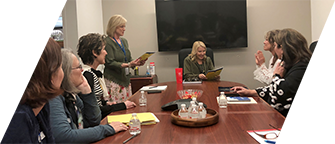2024 Governor’s Budget

Disability Voices United Comments on the Governor’s Proposed FY 24-25 Budget, Department of Developmental Services:
Judy Mark, President
310-621-2045
judymark@dvunited.org
disabilityvoicesunited.org
January 29, 2024
Senator Caroline Menjivar
Chair, Senate Budget Subcommittee #3, Health and Human Services
1021 O Street, Suite 6720
Sacramento, CA 95814
Assemblymember Dr. Corey Jackson
Chair, Assembly Budget Subcommittee #2, Human Services
1021 O Street, Suite 6120
Sacramento, CA 95814
SUBJECT: Comments on Governor’s Proposed FY 24-25 Budget, Department of Developmental Services
Dear Senator Menjivar and Assemblymember Jackson,
Disability Voices United (DVU), a statewide organization directed by and for people with disabilities and their families, appreciates the opportunity to comment on the Governor’s proposed budget for the Department of Developmental Services (DDS).
We recognize that a nearly $38 billion projected budget shortfall does require considering difficult “belt-tightening” measures, such as spending delays and reductions. However, we also see the profound needs that face individuals with intellectual and developmental disabilities as well as the gaps and disparities that plague the delivery of services by regional centers. We will always oppose reductions that will impose added hardship to the individuals in our community who depend on these services and supports.
We have significant concerns about the proposals in the budget to eliminate the Regional Center Participant Choice Specialist positions ($7.2 million) and to return service provider rate reform implementation ($1 billion) from July 1, 2024 to the original implementation date of July 1, 2025. Overall, we are grateful that the proposed budget for the developmental services system does not involve more substantial reductions in services. We offer the following our comments and recommendations below.
OPPOSE: Elimination of Funding for Participant Choice Specialists
The Governor’s budget proposes to eliminate funding for the Regional Center Participant Choice Specialist positions ($7.2 million decrease). Participant Choice Specialists are a critical component of the ongoing implementation of the Self-Determination Program, which already faces significant barriers and bureaucracy, particularly for people of color. Removing these positions could lead to increased disparities and reduced participation in the program.
The Self-Determination Program (SDP), enacted in 2013, provides regional center clients with more freedom, control and flexibility over the services and supports they need. In 2018, the SDP began a three-year phase-in with a cap of 2,500 participants. However, due to slow implementation by DDS and regional centers, less than 500 people were able to enroll. In 2021, the SDP became available to all eligible regional center clients, but as of September 2023, statewide enrollment included only 3,365 participants out of over 355,000 consumers.
The 2021 Budget Act included $7.2 million to fund three-year limited term Participant Choice Specialists for each regional center. In November 2021, DDS issued a directive establishing the positions stating that the Participant Choice Specialists “should be fully dedicated to supporting regional center service coordinators, assisting consumers and families with timely transitions to SDP, and building regional center institutional knowledge regarding participant- directed service options, including SDP.”
The directive makes clear that the Participant Choice Specialists are intended to assist the regional centers in carrying out their statutory SDP responsibilities and, in practice, the specialists have become essential to the implementation of the SDP at all 21 regional centers. We have observed, and heard numerous accounts from participants and family members, that the specialists play a critical role in moving each SDP enrollment request through the bureaucratic processes.
One of the main problems is the limited training on the SDP provided to service coordinators and other staff, even though regional centers are required to provide it in the original statute. Many service coordinators know little about the SDP and often discourage their clients to enter. Service coordinators would lose desperately needed support from these specialists.
In addition, many regional centers use one of the Participant Choice Specialist positions for an SDP specialist in their accounting departments. The SDP uses very different service codes and processes. The elimination of these positions has the potential to grind the SDP to a complete halt.
Without the specialist positions, the regional centers would not be able to maintain even the current subpar SDP enrollment levels. Most importantly, clients and families would be subjected to intolerable delays and administrative burdens, further exacerbating existing barriers to entry.
OPPOSE: Moving back service provider rate reform implementation
The Governor’s budget proposed to return service provider rate reform implementation ($1 billion) from July 1, 2024 to the original implementation date of July 1, 2025. Disability Voices United is deeply concerned about the impact of this proposal on individuals served by regional centers. It is critical for individuals and families to be supported by quality service providers, which requires wages higher than minimum wage, and certainly higher than what one could make at McDonald’s. We are also concerned that if the final rate increases are delayed, the state could face the same issues next year and rate increases might be pushed back once again.
Improving the quality of services and outcomes for people with IDD should be the ultimate goal of the rate increases. However, while the budget proposal mentions “maintaining focus on improving outcomes and quality of services through the Quality Incentive Program,” work in this area has been frustratingly slow. To date, the effort to establish the performance measures that providers must meet to obtain 100% of their rate increase has not produced a usable set of measures to realize full implementation, even if the July 2024 timeframe remained in place. We strongly recommend increased attention to this effort.
Moreover, when the rate study was being considered in the legislature, DVU advocated for – ultimately successfully – ensuring that the rate increases actually result in increased wages for direct support professionals. To date, it is unclear whether the rate increases have led to similar increases in staff wages. DDS and regional centers should provide evidence that there has been appropriate oversight of service providers to ensure this promise is being realized.
SUPPORT: Master Plan for Developmental Services
We strongly support the proposal to develop a Master Plan for Developmental Services and are pleased that in its Program Priorities, the California Health and Human Services Agency has designated as priority one “Building a more equitable system of service delivery for people with intellectual and developmental disabilities.” We are hopeful that the results will improve services and ultimately, the lives of individuals with intellectual and developmental disabilities. While the legislature has made significant investments in the DD system over recent years, too little has been done to link the additional resources for regional centers and service providers to real program improvement and better outcomes. Our specific recommendations for the Master Plan process include:
- Ensure robust participation of individuals with developmental disabilities and their families, without tokenism. Too often the discussions and plans that define the priorities of the service system are dominated by those who operate the system rather than by those who use it. We are not all equal stakeholders, as the individuals and families served by the system clearly have the most at stake.
- Break down the silos and include other departments that interact with people with developmental disabilities, including the Departments of Education, Rehabilitation, Health Care Services, Aging, and General Services.
- Make sure the recommendations drawn from the Master Plan lead to real and urgent reforms of the DD system. Many of us have participated in the various DDS task forces, workgroups, and advisory committees, yet significant reforms and equity remain elusive. The Master Plan must be different.
- Complete the planning process in time to influence the priorities embodied in next year’s budget proposal.
As an organization representing the individuals most impacted by the system, thank you for considering the comments from Disability Voices United. Please feel free to reach out to us with any questions.
Sincerely,
Judy Mark
President, Disability Voices United
cc:
Members of the Senate and Assembly Budget Subcommittees on Health and Human Services
Nancy Bargmann, Department of Developmental Services Debra Cooper, Health and Human Services Agency
Chris Odneal, Department of Finance
Mareva Brown, Office of the Senate President Pro Temp
Elizabeth Schmitt, Senate Subcommittee on Health and Human Services Kelsy Castillo, Office of the Speaker of the Assembly
Nicole Vazquez, Assembly Subcommittee on Health and Human Services Karina Hendren, Legislative Analyst’s Office


 Sergio Aguilar-Gaxiola, MD, PhD
Sergio Aguilar-Gaxiola, MD, PhD